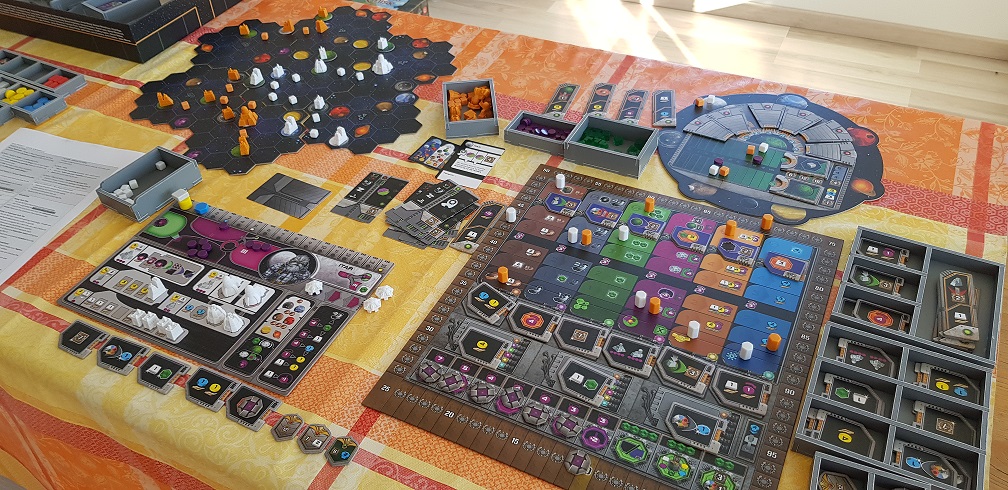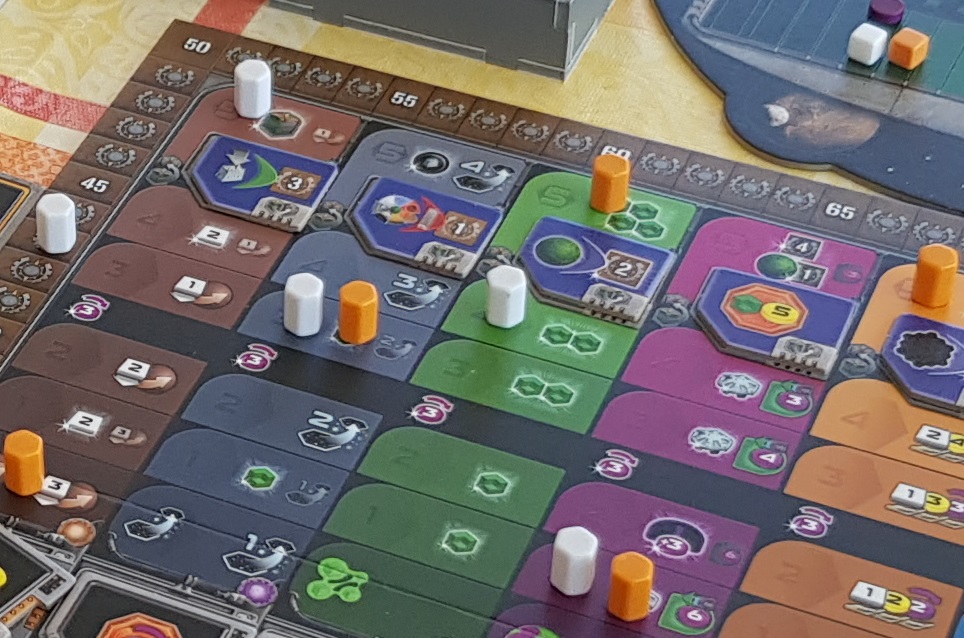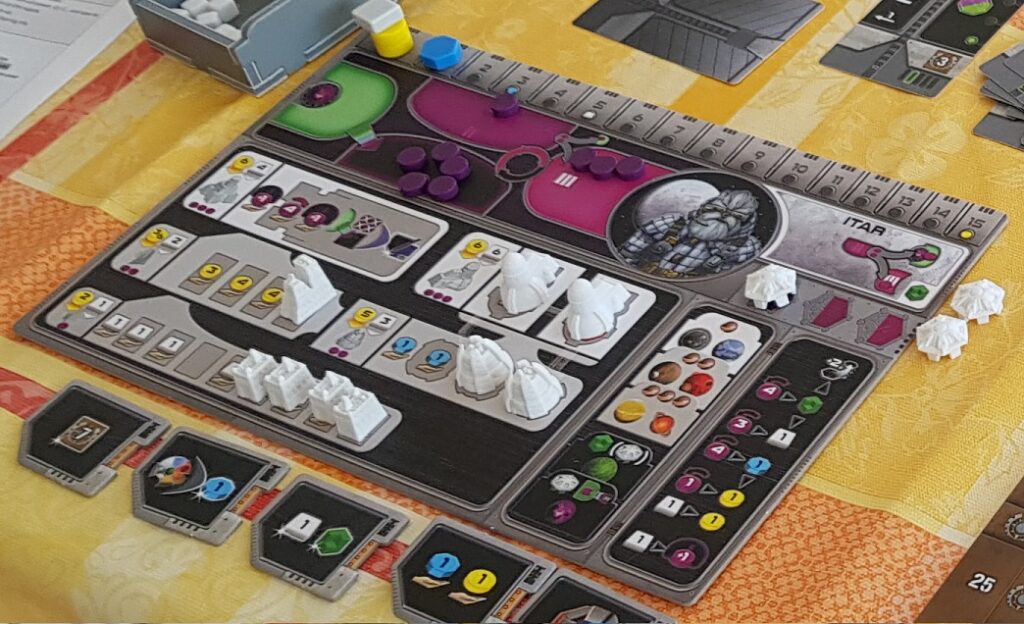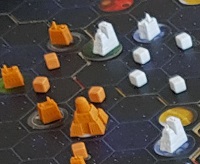In this article, you can find out if Gaia Project is hard to learn (answer: it is and it isn’t) and how best to approach both learning and teaching it.
Is Gaia Project Hard To Learn?
Gaia Project is hard to learn from scratch and by yourself, but it’s very intuitive and natural to teach others. It’s easiest to learn if you have a mentor.
Learning the game alone
Rules and Rulebook
Gaia Project comes with a hefty rulebook and there’s no way around it. Sure, a how-to-play video will show you the flow of the game and it is a great starting point. But to understand the rules in detail (believe me, you don’t want to miss anything), you’ll have to read the rules thoroughly.
The rulebook itself comes with a few quirks. Everything is included, I’ll give it that. But the content is more encyclopedically organized, rather than logically. For example, you can charge one power from II to III by discarding another power token, which counts as a free action. Therefore, the process is explained at the end of the rulebook with the other free actions, instead of in the Power Cycle chapter.
Ideally, I would want the rulebook composition to be more naturally flowing. Meaning you find the rules where you expect them, even if that means they are explained multiple times. I prefer things mentioned one time too many than too little – particularly when there are many intricacies to remember.
Another thing that bothered me was the lack of an overview chart, something that would summarize setup, phases, and basic action rules on an A4 format for quick reference. Luckily, the fans have come to the rescue and there are a few of them available on BGG. I heartwarmingly suggest printing them out.

Practice 2-handed play
That’s the theory, now comes the practice. Set up a two-player game and play both sides while referencing the rules as you need (probably a lot). Then re-read the rules and repeat the process. It’s the best way. You can include a second human player if you have a friend that is on a similar gaming level to you.
Just don’t try to introduce Gaia Project (or learn with) to casual players until you’ve fully grasped it. Also, don’t introduce automa just yet, even if you plan to play exclusively solo. I made that mistake and I was even more confused. Automa uses a different set of rules, and while they are not complicated, they will confuse you when you’re already neck-deep in the “standard” rulebook.
Previous Experience
Gaia Project is an expanded and reskinned Terra Mystica. While some mechanics are perfected, most of the rules are exactly the same. Therefore, if you’re familiar with one, learning the other will be as smooth as learning an expansion for a typical board game.
If you played a game with a similar flow before (phases, action selection, resource management – for me it was Clans of Caledonia) it will help you understand the core principles. But you’ll still have to learn the details of every phase and action, which is the crucial part.
For example, when building a mine, you have to consider distance, planet type, terraforming costs, mine costs, manage your resources with free actions if necessary, and in the end proximity to other civilizations for power charging. Experience with similar games helps, but not as much as you’d expect.

Teaching Gaia Project
On the other hand, teaching Gaia Project is a breeze. The game layout is easy to understand – there are four phases (Income, Gaia, Action, and Cleanup) and three of them are quick maintenance phases. It’s the Action phase where the bulk of things happen and where the players have most of the control.
And there aren’t that many of them either. Just a few basic actions such as building and upgrading structures, forming federations, researching, and passing are needed to play the game.
If you have an experienced player beside you who helps out with the set-up, guides you through actions (“you can’t build a mine here because you don’t have enough ore for terraforming”), and basically runs the game for you, you’ll understand it quickly and learn the rules during the game.
In order to be at least decently competitive, a good teacher will explain to you:
- Teach you about phases. How do they follow each other, why should you take actions, that will give you more income, why is Gaia phase after the Income phase (so that you don’t get your power tokens back for charging).
- They should explain what the Power cycle is, how to manage this resource and how to benefit from it.
- Explain actions, what they do and what they’re good for.
- How you need to build a strong economy of ore, money, and research in the first half of the game.
- How to benefit from the research tracks and how to get tech tiles.
- About planet types, Gaiaforming, and terraforming costs.
- How to score points. For a game to click you must know how to win. What are round goals and which ones you should go for?
- About end-goals, how many points can they get you, and also about the importance of the research tracks when scoring points.
- That there are 14 factions with different home planets, specialties, and styles of play. For this reason, you should be playing a straightforward faction for the first time (i.e. Hadsch Halla).
A good teacher will never hold back any tricks from you. They should help you with the opening (building your first structures), which is super important since it will compound for the rest of the game. They should be helpful with tips, such as resource conversion, free actions (“I see you’re trying to upgrade this trading station, but you’re slightly short on resources. Here are a few ways you can get them.”), and overall strategy – but not to the extent when they’re holding your hand.
A great teacher will let you explore on your own, but will always be there to guide you, should he see you need help.

Learning Gaia Project vs Mastering It
Congratulations, now you know how to play Gaia Project. And good luck on your journey on being any good at it (let alone master it), because it will be a long journey. You see, Gaia Project is a game of open information and no random factor (think chess), which means there’s always an optimal move or strategy to be found. But with the number of variables the game comes with (you won’t believe how different the factions play, i.e.), our tiny brains can only come up with approximations most of the time.
There are even general guidelines on how to open the game and what strategies work best with every faction. If you’re interested, check out the strategy section on BGG and be blown away by the depth some of the guys there go in their analysis. You can easily up your game significantly just by reading forums.
Or don’t do any of that and enjoy discovering it by making mistakes on your own. That’s a perfectly legitimate way (and sometimes even more fun and memorable) of playing a game. Gaia Project has a lot to offer – you just have to know how to take it in.
As for myself, I’m currently at a phase where I’ve mostly learned the rules and am now exploring the different factions by taking place in monthly solo challenges (again, on BGG) – and losing them so far (but enjoying). So, don’t expect any Gaia Project strategy guides on this site anytime soon. 🙂
edit: Here’s the promised strategy article 🙂
Do you like what you just read? Consider subscribing for more content:
